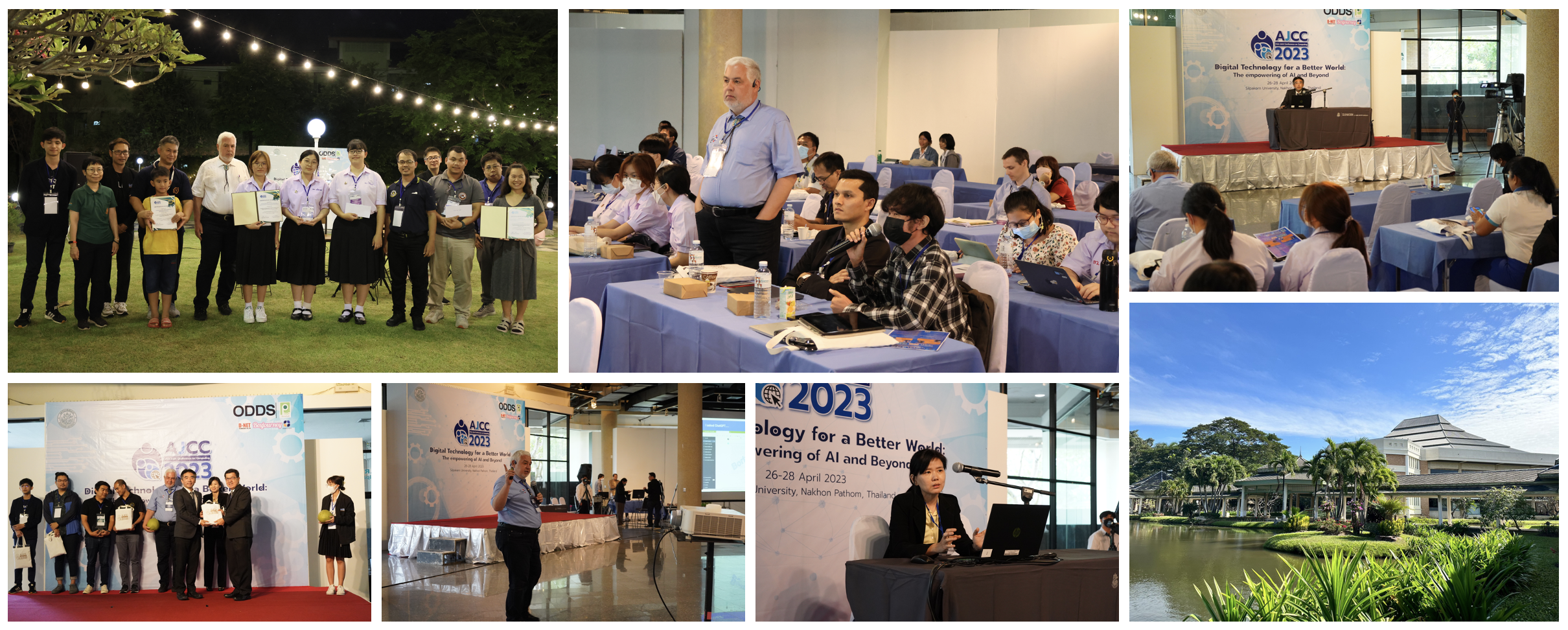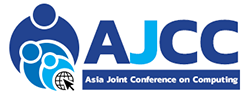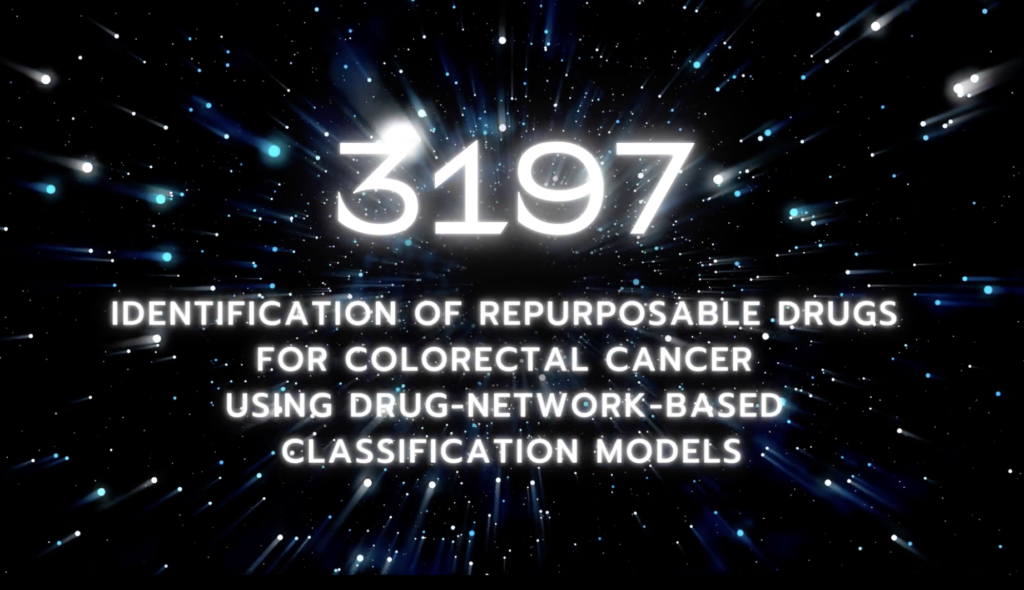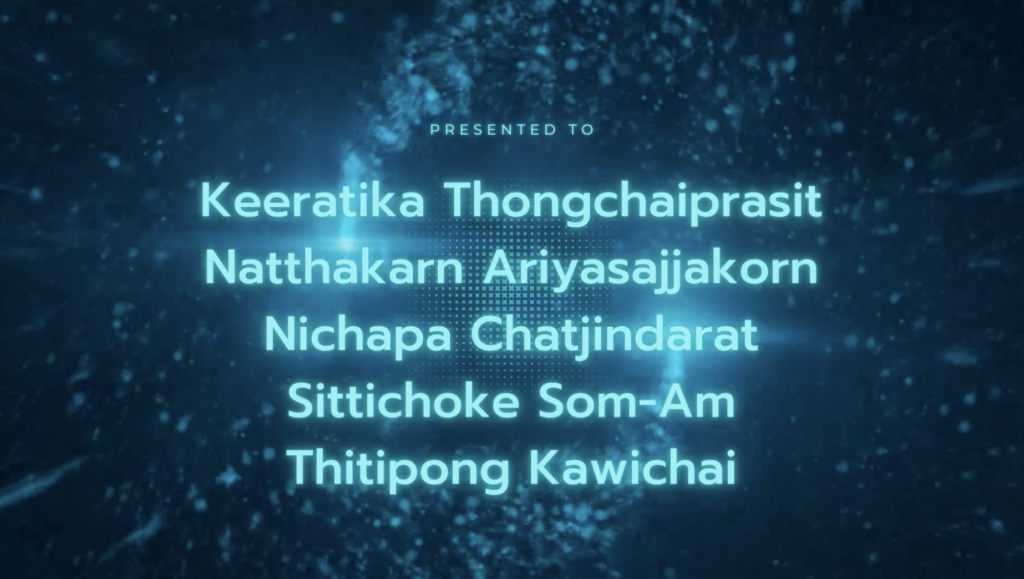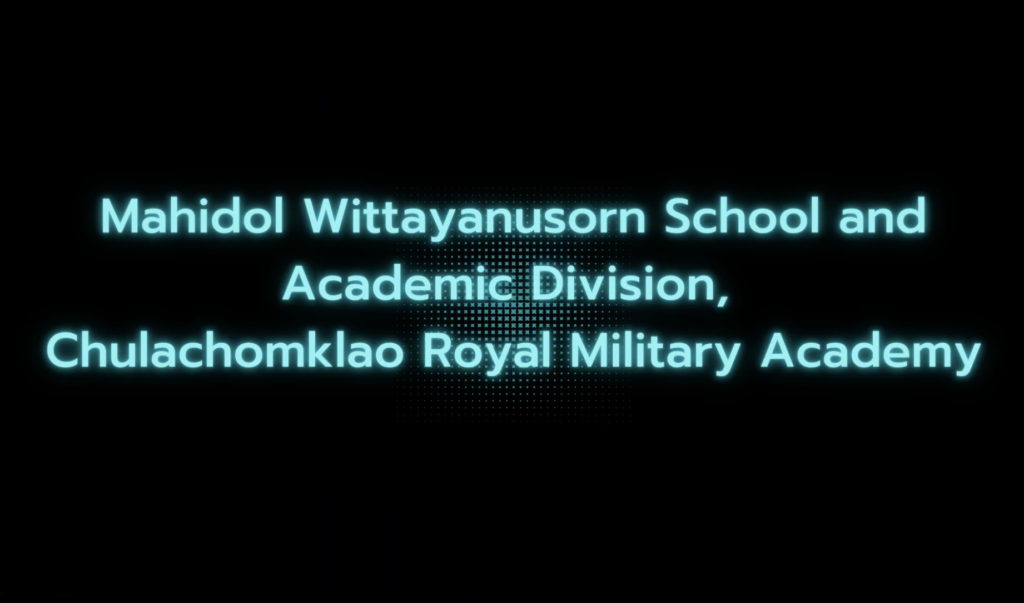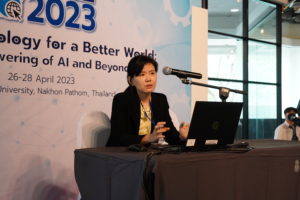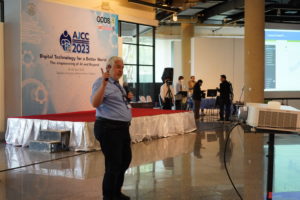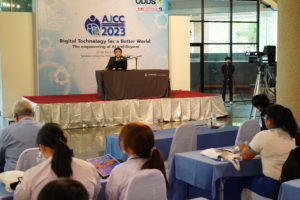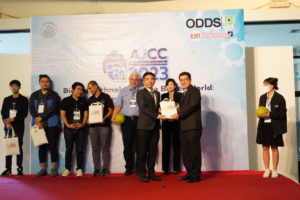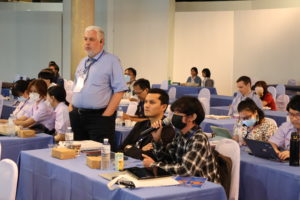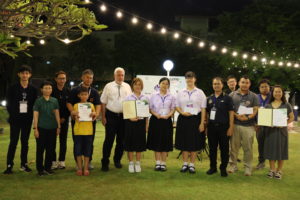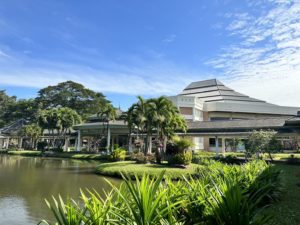AJCC2023
Host: Silpakorn University
Event Date: 26-28 April 2023
Venue: Art and Cultural in Commemoration of H.M. the Kings 6th Cycle,
Silpakorn University, Nakhonphathom, Thailand
Keynote speakers:
Prof. Dr. Chantana Chantrapornchai
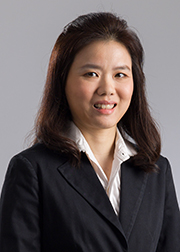
Faculty of Engineering, Kasetsart University, Bangkok 10900, Thailand
Biography:
Chantana Chantrapornchai received the bachelor’s degree in computer science from Thammasat University of Thailand, in 1991, the master’s degree from Northeastern University at Boston, College of Computer Science, in 1993 and the PhD degree from the University of Notre Dame, Department of Computer Science and Engineering, in 1999. Currently, she is a professor with the Department of Computer Engineering, Faculty of Engineering, Kasetsart University, Thailand. Her research interests include parallel computing, cloud computing, big data processing, deep learning application, semantic web, computer architecture, and fuzzy logic. She is also affiliated with HPCNC laboratory. She is currently a principal investigator of GPU Education program and NVIDIA DLI Ambassador at Kasetsart University.
Keynote Topic: Deep Learning: Methods, Trends and Threats
Deep Learning is a branch of machine learning which is a part of artificial intelligence. Recently, it has been recently used in many fields. From the past, it seems difficult and time consuming to build machine learning models. With the pioneer work by Yann LeCun, it had been made possible to create a model which can learn features from the dataset, called representation learning. That is the starting point of deep learning history where we can learn features from data.
In this talk, we review the history of deep learning in the past, including various popular model types and their applications that were emerged. We present the evolution of model structures which also imply the trends and their supports future applications. We address the needs in other application areas, making the deep learning models continues to evolve. Meanwhile, as its uses are widely spread, its downside is appearing. The threats of its are also discussed.
Prof. Dr.-Ing. habil. Dr. h.c. Herwig Unger
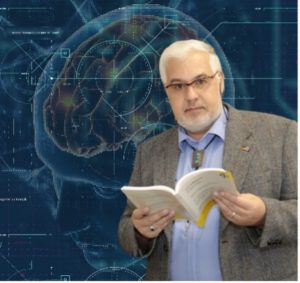
FernUniversität in Hagen, Germany
Biography:
Prof. Dr.-Ing. habil. Dr. h.c. Herwig Unger (*1966) received his PhD with a work on Petri Net transformation in 1994 from the Technical University of Ilmenau and his doctorate (habilitation) with a work on a fully decentralised web operating systems from the University of Rostock in 2000. Since 2006, he is a full professor at the FernUniversität in Hagen and the head of the Department of Communication Networks. In 2019, he obtained a honorary PhD in Information Technology from the King Mongkut’s University of Technology in North Bangkok (Thailand).
His research interests are in decentralised systems and self-organization, natural language, processing, Big Data as well as large scale simulations. He has published more than 150 publications in refereed journals and conferences, published or edited more than 30 books and gave over 35 invited talks and lectures in 12 countries. Beside various industrial cooperation, e.g. with Airbus Industries, he has been a guest researcher/professor at the ICSI Berkeley, University of Leipzig, Universitè de Montreal (Canada), Universidad de Guadalajara (Mexico) and the King Mongkut’s University of Technology North Bangkok.
Keynote Topic: CHATGPT: WHERE IS THE JOURNEY GOING?
It was just a few months ago that the hype around ChatGPT started and millions of users enthusiastically tried out the new service. Besides the new, almost fantastic seeming abilities of the new AI, it was also quickly realized in version 3 that there are limits: besides errors in mathematical derivations, ChatGPT also confronts unabashedly wrong answers like a schoolboy. Except for one not yet sufficient learning process, further explanations or reasons are hard to find: ChatGPT is a black box for outsiders until today, whose content science did not yet explore successfully.
Nevertheless, ChatGPT is an immense enrichment in the field of natural language processing, which can provide standard knowledge needed in everyday life but also special knowledge in chat quickly and without problems.
However, if ChatGPT is reduced to an AI interlocutor, a large part of the possibilities that open up with this bot are given away: if one adds one of the voice assistants from Amazon, Google or Apple as a voice interface, completely new, almost fantastic opportunities open up for building service platforms and (decentralized) social networks with comprehensive, innovative services that have so far only been known from utopian literature. In the lecture, a number of such experimental architectures will be presented and further development possibilities of social networks of the future will be discussed.
Prof. Dr. Pornsak Sriamornsak

Faculty of Pharmacy, Silpakorn University, Thailand. Editor-in-chief of Science, Engineering and Health Studies.
Biography:
Prof. Dr. Sriamornsak is a professor at Faculty of Pharmacy, Silpakorn University; Vice President of Thai Industrial Pharmacist Association; Associate Fellow, Academy of Science, Royal Society of Thailand; Secretary General, College of Industrial Pharmacy of Thailand; Distinguished Adjunct Professor, Saveetha Dental College, India. He got BSc and MSc degrees in pharmacy at Mahidol University, and a PhD degree in pharmaceutics at Charles Sturt University (Australia). His research interests are related to drug delivery system and dosage form design, pharmaceutical nanotechnology and 3D printing technology. He has authored more than 220 publications and given over 370 presentations, invited lectures and seminars in national and international conferences.
He served as an editor-in-chief of Science, Engineering and Health Studies, and as an editorial board member of several journals such as Asian Journal of Pharmaceutical Sciences, Current Drug Delivery, Heliyon. He received many research awards, e.g., Nagai Award Thailand for Research, FAPA Ishidate Award for Pharmaceutical Research, Thailand Distinguished Polymer Scientist, National Distinguished Researcher Award. Recently, he is included in the world’s top 2% of the most-cited scientists 2020, 2021, and 2022, in pharmacology and pharmacy, as ranked by Stanford University.
Keynote Topic: Artificial Intelligence in Pharmaceutical and Healthcare
Pornsak Sriamornsak1,2,3,*, Samart Jamrat1, Kasitpong Thanawuth1
1 Faculty of Pharmacy, Silpakorn University, Nakhon Pathom 73000, Thailand
2 Academy of Science, The Royal Society of Thailand, Bangkok 10300, Thailand
3 Department of Pharmacology, Center for Transdisciplinary Research, Saveetha Dental College, SIMATS, Chennai, India
*Email address of correspondence: sriamornsak_p@su.ac.th
Abstract
Artificial intelligence (AI) is rapidly transforming the pharmaceutical and healthcare sectors, promising better patient outcomes, lower costs, and faster drug development. AI, when applied to the pharmaceutical industry, can quickly extract insights from massive data sets, process data and automate workflows, and convert insights into actions to improve business performance. In this lecture, we will look at how AI is being used in pharmaceutical and healthcare, such as drug discovery and repurposing, pharmaceutical product design, personalized medicine, patient counseling, medication management, and inventory management. This lecture will also provide insights into the current state and future direction of AI in pharmaceutical and healthcare, highlighting the potential benefits and risks associated with this transformative technology.
Keywords: artificial intelligence; pharmaceutical research; healthcare
Awards
Best Paper Award
Best Presentation Awards
Presenter: Nuwee Wiwatwattana, Srinakharinwirot University
Title: M-SES: An online security self-assessment complies with Thailand’s related cybersecurity act
Presenter: Narong Chaiwut, Mae Fah Luang University
Title: Utilization of various time series models forecasting gold prices in Thailand
Presenter: Nuntouchaporn Prateepausanont, Prince of Songkla University
Title: Toward traceability model between ISO/IEC 29110 artefacts and agile process
Presenter: Waraporn Jirapanthong, Dhurakij Pundij University
Title: The PM2.5 heatmap monitoring in microclimate with inverse distance weighting
Presenter: Nitigan Nakjuatong, King Mongkut’s University of Technology North Bangkok
Title: การประมวลผลภาษาธรรมชาติเพื่อปรับปรุงคำผิดที่เกิดจากวิธีการรู้จำอักขระ
Presenter: Taweesak Khumphakdee, Silpakorn University
Title: การสร้างต้นแบบการจำแนกและรูปแบบของการแต่งกายโดยใช้เทคนิคการเรียนรู้ของเครื่อง
Presenter: Supanat Homjan, Silpakorn University
Title: ระบบสารสนเทศเพื่อการบริหารจัดการสินค้าออนไลน์สำหรับผลิตภัณฑ์กลุ่มวิสาหกิจชุมชนจักสานเตยปาหนัน ตำบลแม่ทอม อ.บางกล่ำ จ.สงขลา
Presenter: Ketsara Phetkrachang, Rajamangala University of Technology Srivijaya
Title: An integrative bioinformatics approach in microRNA data analytics of alzheimer’s disease
Presenter: Siow Wee Chang, Universiti Malaya, Malaysia
Title: Nonparametric Bayesian online change point detection using kernel density estimation
Presenter: Kitakorn Homsud and Naruesorn Prabpon, Kamnoetvidya Science Academy
Title: Comparing machine learning methods for early warning of floods and landslides in Thailand
Presenter: Joanna S. Abraham, Ramkhamhaeng University
Title: Prototyping the environment sound classifier and convert into text from videos or audio files by machine learning
Presenter: Naphatsara Thorngsophon, Silpakorn University
Call for papers
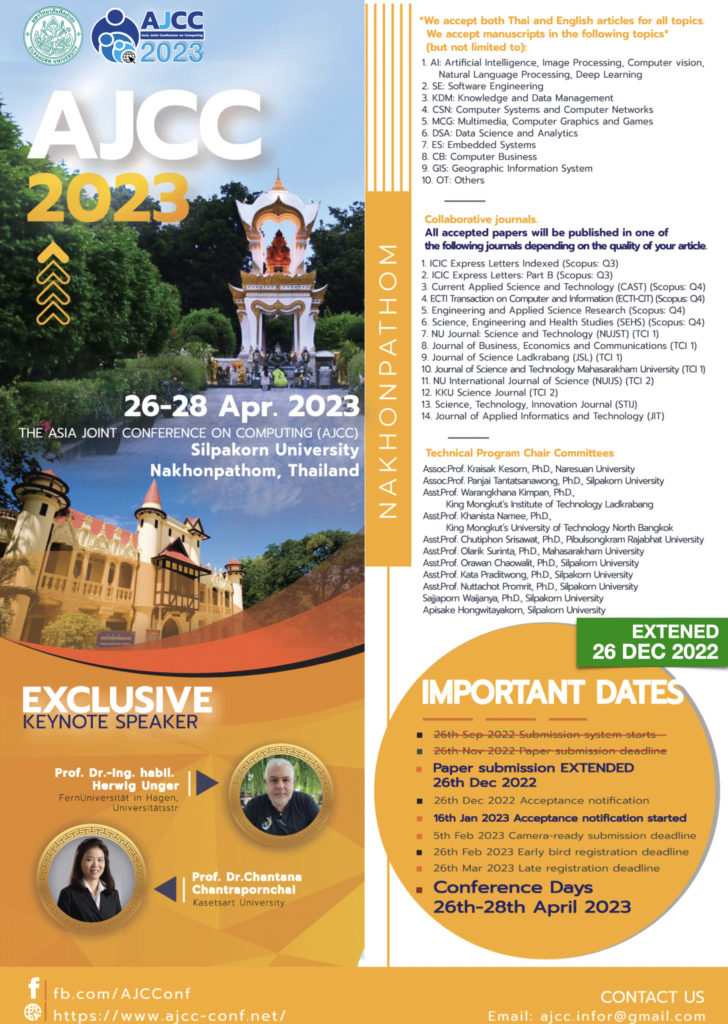
Gallery
For more pictures click on this URL:
https://www.facebook.com/AJCC.conference
https://www.facebook.com/AJCCConf
